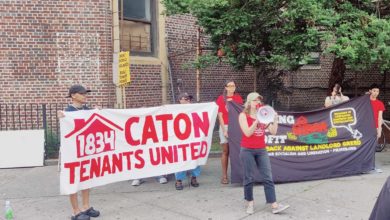On Tuesday, the Supreme Court issued a 5-4 ruling declining to strike down the Centers for Disease Control’s eviction moratorium. This is welcome news to the millions of people behind on their rent, but there is also cause for concern — and an urgent need for Congress to act.
Justice Brett Kavanaugh was the deciding vote and wrote in his concurring opinion that he actually agreed with the plaintiffs representing landlords. Kavanaugh said that the CDC had in fact overstepped its constitutional bounds but that lifting the eviction moratorium now would cause chaos. Because the CDC is ending the moratorium on July 31 anyway and the intervening weeks would allow for the disbursement of congressionally approved rental assistance funds, Kavanaugh argued that it makes sense to hold off on immediately lifting the moratorium on evictions. He added that after July 31 the CDC would need clear congressional approval to extend the eviction moratorium.
The extension of the eviction moratorium is a positive development. People who are struggling to pay back rent that has built up over the course of the pandemic will get to stay in their homes for another month. However, Kavanaugh’s opinion signals that a pro-eviction majority actually exists on the Supreme Court, which is fundamentally on the side of big landlords and developers.
Congress approved $21.5 billion for rental assistance in March, in addition to the $25 billion in rental assistance passed in December. States have used this rental assistance money to hand out housing vouchers for struggling renters. People who need assistance apply online, which can present significant obstacles for many working class people. Currently an estimated 7 million people owe back rent in the United States.
A lack of clear, centralized guidelines for how funds should be distributed has slowed down the process and prevented many people from accessing rental relief. The system to access rental relief is so confusing that the Department of the Treasury had to release five FAQs detailing how people can access these funds, the latest being from June 24. Bureaucracy and contempt for the working class has made accessing relief a nightmare for many. Many people do not have the time or the skills to slog through the highly complex language of the application process.
People who could have qualified for relief are realizing that, even though they may have been eligible, they are unable to receive any of the rental relief because they didn’t apply before a specific deadline. For example, the city of Chicago’s Rental Assistance Program had an application window that closed on April 30th. Currently, nobody in Chicago can apply for rental assistance because the arbitrary deadline has passed. People who applied were placed in a lottery and then picked at random. This was done because the funds allocated for rental relief were clearly not sufficient and the city couldn’t process all of the demand.
Even with the CDC moratorium, some evictions are still taking place. The Supreme Court allowed for one more month of breathing room, but at the same time made it clear that it cannot be relied on to defend the right to housing. After the moratorium expires, huge numbers of people may be kicked out of their homes unless Congress steps up, ends the bureaucratic charade, and cancels the rent that has accumulated during the pandemic.






